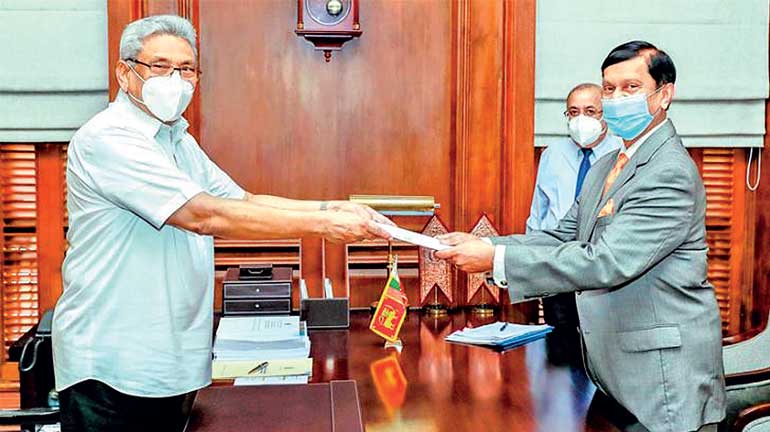Sunday Feb 15, 2026
Sunday Feb 15, 2026
Tuesday, 5 October 2021 02:42 - - {{hitsCtrl.values.hits}}

CBSL Governor Ajith Nivard Cabraal presenting the six-month Road Map, which contains a long “to-do-list” of ad hoc, piecemeal measures and does not present any coherent monetary policy framework, which is the prime responsibility of the CBSL
 Amidst a severe economic crisis facing Sri Lanka characterised by heavy debt commitments, fiscal imbalance, international reserve depletion, rupee depreciation, import shortages, and inflationary pressures, the Central Bank of Sri Lanka (CBSL) has become dysfunctional in its key role – monetary policy operation. The market players who act rationally are far ahead of the policymakers, and eventually, the CBSL has lost its grip on both the exchange rate and interest rates.
Amidst a severe economic crisis facing Sri Lanka characterised by heavy debt commitments, fiscal imbalance, international reserve depletion, rupee depreciation, import shortages, and inflationary pressures, the Central Bank of Sri Lanka (CBSL) has become dysfunctional in its key role – monetary policy operation. The market players who act rationally are far ahead of the policymakers, and eventually, the CBSL has lost its grip on both the exchange rate and interest rates.
Such policy ineffectiveness caused by the rational behaviour of market players or agents is vividly elaborated in the Rational Expectations Hypothesis in Economics. This hypothesis is motivated by the same thinking that led Abraham Lincoln to assert, “You can fool some of the people all of the time, and all of the people some of the time, but you cannot fool all of the people all of the time.”
Six-month Road Map
It is in this background that the CBSL Governor Ajith Nivard Cabraal presented the six-month Road Map last week. While it contains a long “to-do-list” of ad hoc, piecemeal measures, it does not present any coherent monetary policy framework, which is the prime responsibility of the CBSL, to tackle the macroeconomic imbalances mentioned above.
For example, instead of devising a flexible exchange rate and interest rate mechanism to overcome the foreign exchange crisis, the Governor accused the exporters of “hoarding” their foreign exchange earnings abroad and threatened them with heavy tax penalties. While avoiding an IMF bailout, even the much-publicised home-grown policies are missing in the Road Map.
As I predicted in the last week’s FT column, with its home-grown policies sans IMF bailout, the CBSL has no option other than to continue money creation and anti-market monetary controls, (https://www.ft.lk/columns/Central-Bank-to-continue-home-grown-policy-experiments-without-IMF-bailout/4-723568). My prediction is proved to be correct, as evident from the Road Map. In the absence of a robust monetary policy framework, the surge in market liquidity will continue exerting severe demand pressures on the exchange rate, imports, and inflation.
CBSL plays a passive role
While attempting to maintain a fixed exchange rate since last year, the CBSL has accommodated excessive Government borrowings by purchasing Treasury bills and bonds in the primary market causing a rapid increase in the currency issues, which is commonly known as money printing. Hence, the CBSL is unable to use Open Market Operations, which is a key monetary policy instrument, to sell those securities for mopping up excess liquidity. Also, it does not have much space to increase the policy interest rates to reduce bank credit due to possible cost implications for the public debt.
Thus, the CBSL plays a passive role as regards its key monetary policy instruments: open market operations, policy interest rates, and exchange rate management. The Road Map does not attempt to reactivate the now-defunct monetary policy.
Exporters whipped
Presenting the Road Map, Governor Cabraal warned, “We will strengthen mandatory conversion of export proceeds and request the government to tax profits of exporters at 28% instead of 14% where the foreign exchange is not repatriated and converted.”
This type of tough-minded warning is not only a disincentive to the export sector but also beyond the gamut of monetary policy. Instead of addressing the problem of the alleged delays in the repatriation of export proceeds through market-based monetary policy instruments such as exchange rate and interest rate flexibility, the CBSL has opted to whip the exporters, unmindful of the adverse consequences.
Speculation in the forex market
The CBSL, in an unusual press notice issued last week states, “It also appears that due to undue speculation on exchange rate movements, there has been a reluctance to convert export earnings during the period from January 2020 to July 2021, thereby limiting inflows to the domestic foreign exchange market. … In addition, with low rupee interest rates, some exporters have found it more lucrative to borrow and import to meet their input requirements, leading to further tension in the domestic market.” (Please see: https://www.cbsl.gov.lk/sites/default/files/cbslweb_documents/press/pr/press_20210927_repatriation_and_conversion_of_export_proceeds_e.pdf).
Thus, the CBSL admits that there is market speculation on exchange rate movements. This implies that the market players have no confidence in the exchange rate margins declared by the CBSL, and they expect further depreciation of the rupee. Ironically, the CBSL also confesses that some exporters tend to borrow locally at low interest rates to meet their import outlays.
Impossible trinity
The above speculative environment is created by the CBSL itself, and therefore, it is unfair to accuse the exporters who act rationally forming their expectations about future behaviour exchange rate and interest rate movements.
As I repeatedly mentioned in this series, no central bank in the world can escape the hard principle of “Policy Trilemma” or “Impossible Trinity” in Economic Theory. It means that a central bank cannot fix the exchange rate and interest rates at the same time without entertaining capital outflows. As the CBSL has anchored both the exchange rate and interest rates simultaneously, exporters act wisely to keep their export earnings abroad anticipating rupee depreciation, and borrow locally taking advantage of low interest rates.
Rational market players cannot be fooled
Exporters should not be blamed for delaying forex conversion, as they have acted wisely diffusing the poor monetary policy decisions of the CBSL. They rationally form expectations about the future movements of the exchange rate and interest rates based on all available information. Given the current forex shortages, they anticipate further rupee depreciation in the coming months so, instead of converting foreign exchange, they borrow locally to meet their current costs. As a result, the CBSL’s attempt to simultaneously keep the exchange rate and interest rates within a fixed margin is defeated.
This can be elaborated by applying the Rational Expectations Hypothesis (REH) which was originally proposed by John F. Muth in 1961. It became influential in macroeconomics later when Robert Lucas argued in a seminal paper in 1972 that monetary policy changes become ineffective when market agents anticipate such changes by forming their expectations rationally.
In the case of Sri Lanka, exporters rationally anticipate a drastic rupee depreciation soon, and therefore, they borrow locally keeping their forex earnings intact.
Exporters disappointed
The CBSL’s press notice further states, “As would be well appreciated, an export would realise its objective only when it finally culminates in the flow of foreign exchange that is generated by the export into the country’s financial system in its local currency. That objective would obviously not be fulfilled if the final conversion of export proceeds into local currency does not take place. Accordingly, steps must be taken to strengthen the systems to ensure monitoring and to implement measures that lead to this objective. It is only then that the gap between the foreign exchange liquidity provided through exports and the foreign exchange liquidity demand for imports would reduce to the level as published in the Central Bank’s own reports.”
The Exporters’ Association, the Joint Apparel Association Forum, and the Sri Lanka Association of Manufacturers and Exporters of Rubber Products have categorically denied the CBSL’s allegation of ‘hoarding’ foreign currency earnings. They are deeply disturbed by the negative connotations and inferences cast on the export sector by the CBSL in its press notice.
The Road Map envisages further strengthening mandatory conversion of export earnings and monitoring foreign exchange inflows. These offensive measures do not augur well for a free market economy.
Road Map silent on fiscal expansion
The under-subscription to the extent of 40% in the Treasury bill auction held last week indicates that the marginally increased cut-off yield rates are insufficient to sell the entire bill stock to the market. The balance portion of the Treasury bills was to be purchased by the CBSL causing a rise in its monetary base, and in turn, the currency issue and the aggregate money supply.
The Road Map is silent on such fiscal dominance which restricts the space available to conduct monetary policy.
IMF bailout not on the cards
The Road Map rules out seeking assistance from the IMF. Given the foreign exchange shortages compounded by the heavy external debt commitments, it would be ideal to enter into an agreement with the IMF to ease the balance of payments difficulties, as I argued in a previous column of this series (https://www.ft.lk/columns/Denying-IMF-support-is-no-solution-for-Sri-Lanka-s-economic-woes/4-721234).
Such an arrangement would provide sufficient breathing space to implement the adjustment policies that are essential to restore economic stability and facilitate economic growth.
The IMF’s lending conditions are designed to execute its loan facilities and to ensure that the borrowing country will adopt the policy reforms that are needed to restore macroeconomic stability, particularly concerning the fiscal sector and balance of payments.
IMF programs not only help to reduce the risk of loan default but also confer a “seal of approval” regarding the credibility of the macroeconomic policies. This enables the country to borrow from capital markets at a low cost and to attract Foreign Direct Investment (FDI).
Continuous borrowing from sources other than the IMF has become the preferred choice of the country’s top policymakers to avoid painful structural reforms that may hurt the voter base. For example, it is reported that discussions with the Chinese Government are currently in progress to purchase fuel for six months on a Sovereign Bond. such commercial borrowings will further aggravate the debt crisis.
The IMF assistance is subject to the borrowing country’s obligation to implement the conditionalities aimed at improving government finances and external payments. These conditionalities, known as “structural adjustment policies”, include budget deficit reduction, removing price controls and state subsidies, privatising state-owned enterprises, liberalising foreign trade and exchange systems, adopting flexible interest and exchange rates, and removing barriers to foreign capital flows.
As the CBSL is not in favour of an IMF program targeting such housekeeping reforms owing to political considerations, Sri Lanka will have to bear huge adjustment costs in time to come to rectify the grave macroeconomic imbalances, causing enormous hardships to the people.
(The writer is Emeritus Professor of Economics at the Open University of Sri Lanka and a former Central Banker, reachable at [email protected])